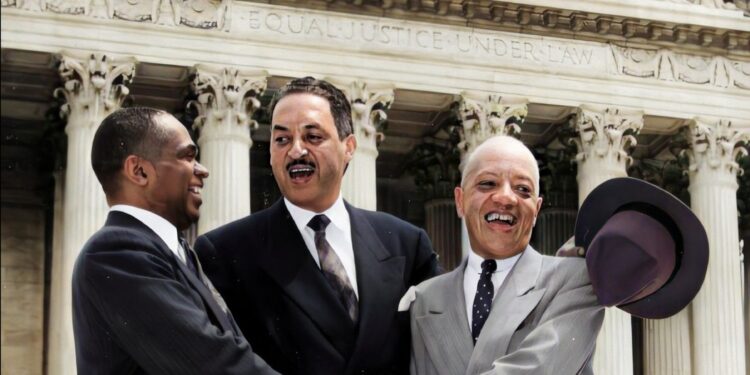April 16, 2025 Story by: Editor
Thoroughgood (Thurgood) Marshall was born on July 2, 1908, in Baltimore, Maryland, to William Marshall, a railroad porter, who later worked on the staff of Gibson Island Club, a white-only country club and Norma Williams, a school teacher.
One of his great-grandfathers had been taken as a slave from the Congo to Maryland where he was eventually freed. Marshall graduated from Lincoln University in 1930 and applied to University of Maryland Law School – he was denied admission because the school was still segregated at that time. So Marshall matriculated to Howard University Law School where he graduated first in his class and met his mentor, Charles Hamilton Houston, with whom he enjoyed a lifelong friendship.
Immediately after graduation, Marshall opened a law office in Baltimore, and in the early 1930s, he represented the local NAACP chapter in a successful lawsuit that challenged the University of Maryland Law School over its segregation policy. In addition, he successfully brought lawsuits that integrated other state universities.
In 1936, Marshall became the NAACP’s chief legal counsel. The NAACP’s initial goal was to funnel equal resources to black schools. Marshall successfully challenged the board to only litigate cases that would address the heart of segregation.
Marshall founded LDF in 1940 and served as its first Director-Counsel. He was the architect of the legal strategy that ended the country’s official policy of segregation. After founding the NAACP Legal Defense Fund in 1940, Marshall became the key strategist in the effort to end racial segregation, in particular meticulously challenging Plessy v. Ferguson, the Court-sanctioned legal doctrine that called for “separate but equal” structures for white and Black people.
Marshall won a series of court decisions that gradually struck down that doctrine, ultimately leading to Brown v. Board of Education, which he argued before the Supreme Court in 1952 and 1953, finally overturning “separate but equal” and acknowledging that segregation greatly diminished students’ self-esteem. Asked by Justice Felix Frankfurter during the argument what he meant by “equal,” Mr. Marshall replied, “Equal means getting the same thing, at the same time, and in the same place.
In 1957, LDF, led by Marshall, became an entirely separate entity from the NAACP with its own leadership and board of directors and has remained a separate organization to this day.
Marshall constantly traveled to small, dusty, scorching courtrooms throughout the South at one point, overseeing as many as 450 simultaneous cases. Among other major victories, he successfully challenged whites-only primary elections in Texas in addition to a case in which the Supreme Court declared that restrictive covenants that barred Black people from buying or renting homes could not be enforced in state courts.
In 1961, President Kennedy nominated Marshall to the U.S. Court of Appeals for the 2nd Circuit in which he wrote 112 opinions, none of which were overturned on appeal. Four years later, he was appointed by President Johnson to be solicitor general.
Marshall was the first Black U.S. Supreme Court Justice. He served as Associate Justice from 1967-1991 after being nominated by President Lyndon B. Johnson.
As a Supreme Court Justice, he became increasingly dismayed and disappointed as the court’s majority retreated from remedies he felt were necessary to address remnants of Jim Crow. In his Bakke dissent, he wrote: “In light of the sorry history of discrimination and its devastating impact on the lives of Negroes, bringing the Negro into the mainstream of American life should be a state interest of the highest order. To fail to do so is to ensure that America will forever remain a divided society.”
In particular, Marshall fervently dissented in cases in which the Supreme Court upheld death sentences; he wrote over 150 opinions dissenting from cases in which the Court refused to hear death penalty appeals. Among Marshall’s salient majority opinions for the Supreme Court were: Amalgamated Food Employees Union v. Logan Valley Plaza, in 1968, which determined that a mall was “public forum” and unable to exclude picketers; Stanley v. Georgia, in 1969, held that pornography, when owned privately, could not be prosecuted. “If the First Amendment means anything, it means that a state has no business telling a man, sitting alone in his own house, what books he may read or what films he may watch”; and Bounds v. Smith, which held that state prison systems must provide their inmates with “adequate law libraries or adequate assistance from persons trained in the law.”
Marshall retired from the bench in 1991 and passed away on January 24, 1993, in Washington D.C. at the age of 84. Civil rights and social change came about through meticulous and persistent litigation efforts, at the forefront of which stood Thurgood Marshall and the Legal Defense Fund. Through the courts, he ensured that Black people enjoyed the rights and responsibilities of full citizenship.
Source: Legal Defense Fund
















